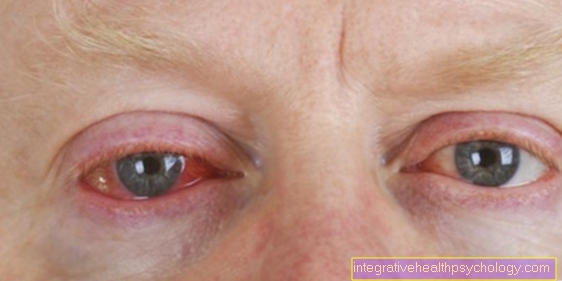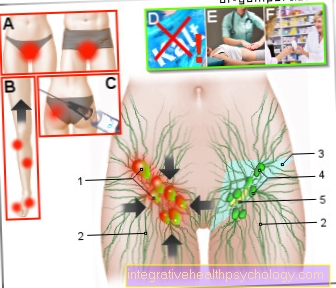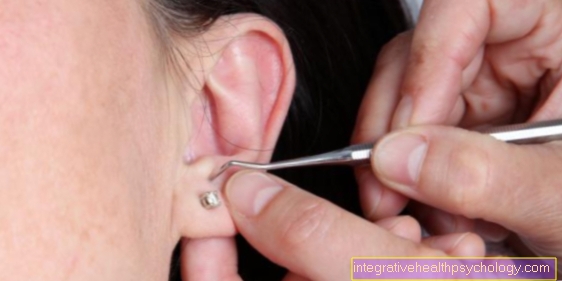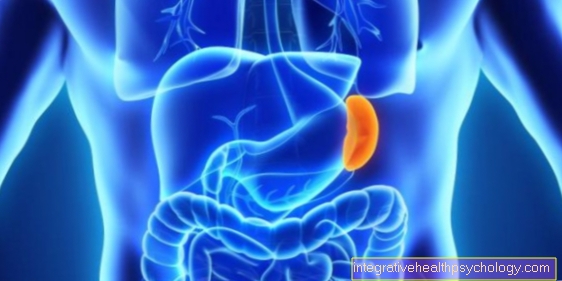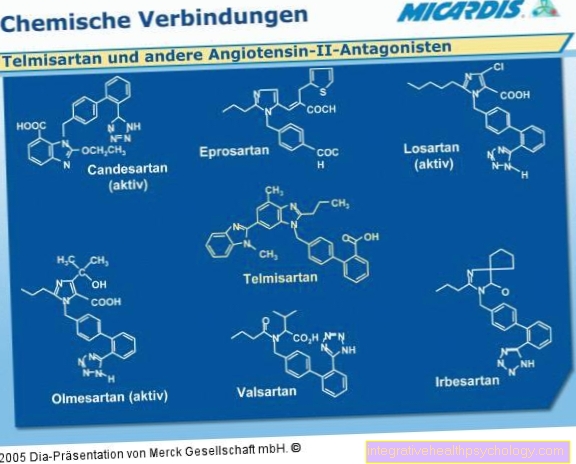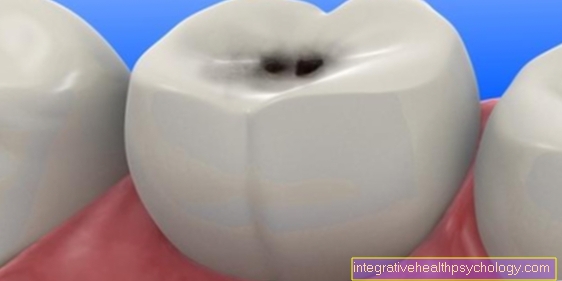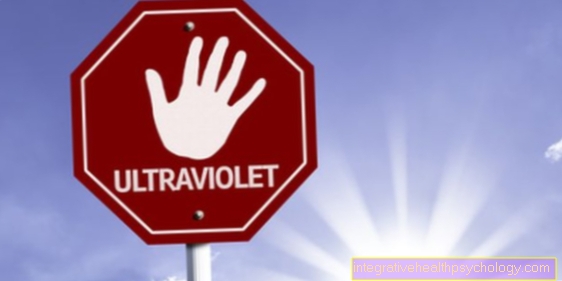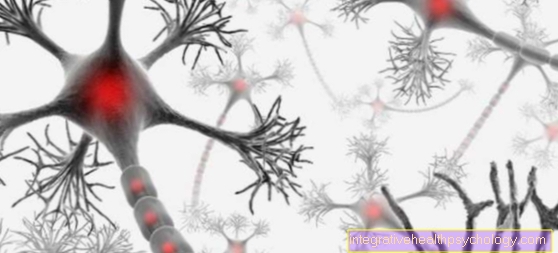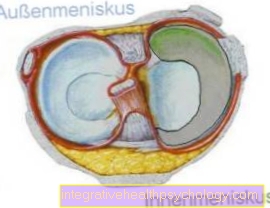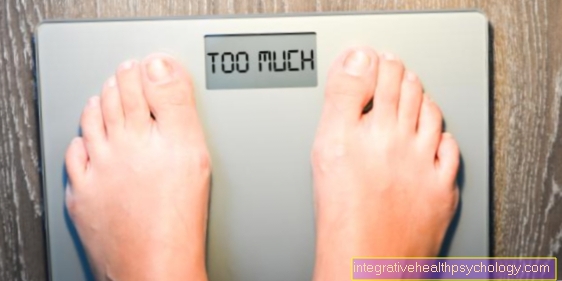Hepatitis B vaccination
Vaccination for hepatitis B
Vaccination against hepatitis B has been recommended in Germany by the Standing Vaccination Commission (STIKO) since 1995. Hepatitis B is an inflammatory disease of the liver caused by the hepatitis B virus (HBV). The virus is transmitted through body fluids (parenteral), especially through blood, but also through vaginal secretions and semen or breast milk.
Read more on this topic: Transmission of hepatitis B
Since it is only possible to become infected with the hepatitis D virus if you are infected with hepatitis B, this vaccination also protects against the hepatitis D virus.

Who is the vaccination useful for?
The vaccination is particularly useful for infants and can be started from the second month of life. The vaccination is also recommended for people with a severely weakened immune system. These are, for example, people who suffer from kidney failure and have to be dialyzed, patients with pre-existing liver disease or HIV patients. Vaccination is also recommended for people who have an increased risk of infection, for example people who travel to countries in which a high level of infection with the virus has been proven, or who have frequently changing sexual contacts and people who either have regular contact with people infected with chronic hepatitis B for family or work-related reasons, or. These can be people who are in close contact with hepatitis B patients, but above all people who are more likely to come into contact with blood, e.g. staff in:
- medical area
- Nurses
- police officers
- drug addicts
- dialysis patients
- transfusion-dependent patients or
- Patients before major surgery
You might also be interested in this topic: Transmission of hepatitis B
What should be considered with children?
Since vaccinations are very important for children to protect against infectious diseases, all vaccinations recommended by the Standing Vaccination Commission should be carried out in good time. The belief that having suffered illness is better protection than vaccination is misleading. If vaccinated children come into contact with pathogens, the body starts the desired defense reaction. But since he is prepared for it through the vaccination, the body can react in a targeted manner and the child does not get sick. When vaccinating, it should be ensured that the child is healthy at the time of vaccination and is not allergic to any components of the vaccine. Children are usually more sensitive to pain and have a thinner layer of fatty tissue under the skin. Therefore, vaccinations are given in the front of the thigh in young children. The specialty of the hepatitis vaccination in infancy is that no test has to be carried out to prove the presence of antibodies in the blood to ensure that the vaccination is successful.
Read more information on the topic at: Should I get my baby vaccinated?
Where can I have such a vaccination?
In general, any doctor is allowed to have the vaccination. The hepatitis B vaccination for children is usually carried out by the pediatrician. If adults want a vaccination, the family doctor can do this or refer them to a specialist. If the reason for the vaccination is a trip abroad, the Tropical Institute can also be the right contact. In the case of a vaccination for professional reasons, the company doctor is usually responsible.
When is vaccination protection available?
From when the vaccination protection exists after the hepatitis B vaccination depends very much on the defense reaction of the immune system of the respective recipient. In some people, this is so fast that a sufficient number of antibodies are in the blood just four to six weeks after the vaccination. However, since it is not certain whether this number can last for life without a third vaccination, all three vaccinations should always be carried out. To ensure adequate vaccination protection, the number of antibodies in the blood is checked four to eight weeks after the last vaccination.
How often do you have to vaccinate?
In the case of infants, the vaccination is usually given together with other vaccines, for example the vaccine against whooping cough. This starts from the second month. A total of four vaccinations are carried out. The first three vaccinations are given every month and the last vaccination after about a year. If you are only vaccinated against hepatitis B, the second vaccination can be omitted. Adults are vaccinated against hepatitis B three times.
What is the interval between vaccinations?
Adults are given three vaccinations to ensure safe vaccination protection. The second vaccination is given one month after the first vaccination. The third vaccination will then be carried out after another five months.
When does it need to be refreshed?
If all doses of the hepatitis B vaccination have been received, the success of the vaccination is tested with a blood sample after four to eight weeks. This determines whether the body has formed a sufficient number (at least 100 international units per liter) of antibodies to protect against hepatitis B viruses. If this is confirmed, there is generally lifelong vaccination protection and there is no need for a booster. However, the test should be used in patients who e.g. have a weakened immune system due to a disease, to be carried out annually. People who have an increased risk of infection, e.g. by having a job in the medical field, should be tested every ten years. If the antibodies in the blood have fallen sharply, a booster vaccination is recommended for these groups of people.
It is also possible after contact with the pathogen to take a measure to protect the body and thus to escape the outbreak of the disease. For detailed information, read our article: Post exposure prophylaxis - the salvation?
What are the costs of the vaccination?
The cost of a hepatitis B vaccination depends on the doctor or hospital in which it is carried out. On average, it is around 60 euros per vaccination. Since three vaccinations are necessary, the vaccination costs a total of 180 euros. The combination with a hepatitis A vaccination is usually a bit more expensive and amounts to around 80 euros per vaccination. In some cases, an additional consultation fee may be due.
Who pays for the hepatitis B vaccination?
In general, the costs of vaccinations recommended by the Standing Vaccination Commission (STIKO) are paid for by the health insurance company. Therefore the hepatitis B vaccination is adopted for children and adolescents. For adults, it depends on the health insurance company whether the vaccination is paid for or subsidized. People who are exposed to an increased risk of infection due to their job are often required by their employer to have a hepatitis B vaccination. In this case, however, the costs are usually covered by the employer himself.
Read a lot more information on this topic at: Hepatitis B vaccination
Twinrix
Twinrix® is a combination vaccine to prevent infection with hepatitis A and hepatitis B. The vaccine contains inactivated components of the hepatitis A and hepatitis B virus, which are no longer dangerous. The killed virus components trigger an immune reaction in the body. The body forms antibodies against components of the hepatitis A and B viruses, these are responsible for marking viruses, whereupon they can be recognized and killed by the immune system. In this way a possible infection can be combated effectively. These antibodies persist after vaccination. If the vaccinated person becomes infected with hepatitis A or hepatitis B, the viruses can be killed quickly before they can harm the body and make it sick. The Twinrix vaccine can be used from the age of 16 years.
Twinrix® is available both in a dosage for children and in a dosage for adults.
Read more on the subject below: Twinrix®
What side effects can the vaccination have?
The hepatitis B vaccination can cause slight irritation of the injection site, depression and headache as side effects in about 1 in 10 patients. In slightly fewer patients, the puncture site swells, becomes red and itchy. In addition, some people feel unwell and develop gastrointestinal discomfort. This is usually diarrhea and occasionally vomiting. The purpose of vaccination is to activate a defense reaction of the immune system against the vaccine. This works just like the body's defense against infection. This can lead to similar symptoms such as fever, sore throat, swelling of the lymph nodes or aching limbs as a side effect of the hepatitis B vaccination. In rare cases, skin abnormalities or itching occur in different parts of the body. In addition, individual cases have been observed in which diseases of the blood, brain or nervous system developed after the vaccination. However, it was partly proven in current studies that the vaccination was not the cause of the disease, but only happened to be related to it in time.
Many doctors recommend a short period of grace after a vaccination, i.e. avoiding vigorous physical activity for a few days.
Read more on this topic at: Can you do sports after a vaccination?
For more information on side effects, see: Side effects from vaccinations in babies
Pain after vaccination
After the vaccination there may be pain, especially in the area of the injection site. There may be redness and swelling, which is a painful reaction from the immune system. However, this pain and discomfort should go away a few days after the vaccination, otherwise you will need to see your doctor again. In addition, in rare cases, the body's defense reaction against the vaccine can lead to fatigue, which is associated with aching limbs.
Read more on this topic at: Pain after vaccination - this is what you should be aware of
Can vaccination cause MS?
In the past, some people developed multiple sclerosis (MS) or had a flare-up of an existing MS disease some time after a hepatitis B vaccination. The body's immune system is influenced by a vaccination. Since the properties of the immune system are also linked to the development of an MS disease, it was suspected that a hepatitis B vaccination could trigger MS. However, this has been refuted by recent studies. It is therefore assumed that the individual cases must have been randomly consecutive events that happened independently of one another.
Read more on the subject at: multiple sclerosis
When is it not allowed to be vaccinated?
The hepatitis B vaccination must not be carried out if it is known that there is an allergy to a component of the vaccine or if serious complications have arisen from a vaccination that has already been carried out. Even with infectious diseases that are present at the planned time of vaccination and are associated with fever (body temperature from 38.5 ° C), vaccination is not permitted. However, minor illnesses should be discussed with the doctor. This also applies to an existing pregnancy.
Can I vaccinate during pregnancy?
In principle, vaccinations can be carried out during pregnancy as long as they are not live vaccines. Since this is not the case with the hepatitis B vaccination, the vaccination can also be carried out during pregnancy. However, pregnancy or suspicion of being pregnant should be reported to the doctor. In this way, depending on the situation, a decision can be made as to whether a vaccination is possible or even recommended.
Further interesting information on this topic can be found at: Vaccination during pregnancy
Can I drink alcohol after a vaccination?
Both the consumption of alcohol and the vaccine itself keep the body busy. Alcohol degradation and the immune system's defense reaction, which leads to the production of antibodies, cost energy. Although this involves increased effort, it does not weaken the success of the vaccination. Therefore, alcohol can be drunk after vaccination. However, should be limited to very small amounts so as not to double weaken the body.
Is that a live vaccine?
The hepatitis B vaccine is not a live vaccine. Only components of the virus that can no longer multiply are injected. Therefore you cannot get hepatitis B through the vaccination and you cannot infect other people with it. Nevertheless, the body starts a defense reaction against the viruses. In doing so, it forms antibodies that mark the virus for degradation by the immune system. These persist in the body and protect it from contracting hepatitis B in the future.
Read more on the subject at: Live vaccination
You can also passively vaccinate against hepatitis B. With passive vaccination, antibodies against the hepatitis B virus are injected directly. Since the body does not have to produce the antibodies itself, they are available more quickly, but the protection is not permanent because it is not "learned“Was to make the antibodies itself. For this reason, passive vaccination is used when someone has had contact with material infected with hepatitis B (especially in the medical field, here this is referred to as post-exposure prophylaxis). It is usually done in combination with an active vaccination.
Passive vaccination is also used in newborns within the first 12 hours of life if the mother is positive for hepatitis B. Nevertheless, these children then receive the regular active vaccination according to the STIKO scheme.
Vaccination doesn't work - non-responders
The number of antibodies against hepatitis B in the blood is measured four to eight weeks after the last vaccination. A value of over 100 international units per liter (IU / L) should be available to ensure vaccination protection. If the result is below 10 IU / L, one speaks of a non-responder. So the vaccination didn't work because the immune system didn't react and didn't produce enough antibodies. With such a result, it should be checked whether there is already a hepatitis B infection. If this is not the case, up to three further vaccinations are carried out, with the test for antibodies being repeated after four to eight weeks after each of these vaccinations. As soon as there are enough antibodies there is no need to vaccinate. If this is still not the case after the three additional vaccinations, nothing will be done initially. In the case of infection with a hepatitis B virus, passive vaccination can be given, in which the antibodies against the virus are injected directly.
What is Hbs?
Hbs stands for Hepatitis B Surface and describes a structure that is part of the hepatitis virus. Structures that can be recognized by antibodies are called antigens. The HBs antigen is part of the hepatitis virus that can be recognized by the body's own antibodies. These mark the virus and initiate its destruction by the immune system. This mechanism is used in vaccination. Because only the HBs antigen, a small structure of the virus that cannot multiply, is vaccinated. The body then forms antibodies against the HBs antigen, which can also be used to fight future viruses.









